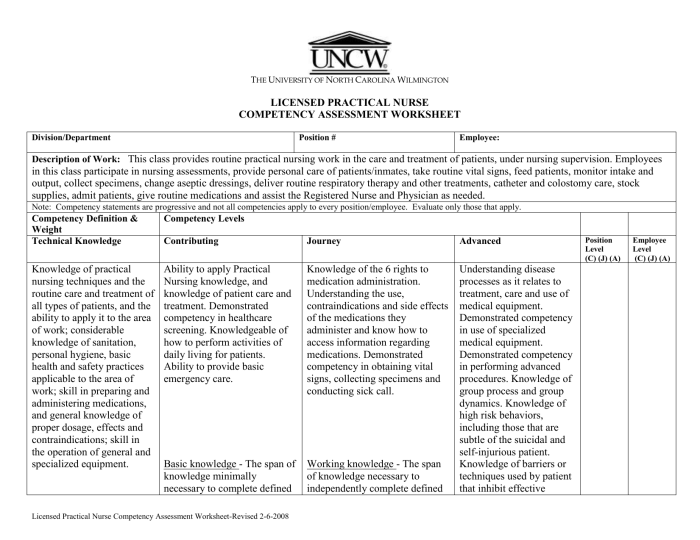Nursing competency test questions and answers – Navigating the intricacies of nursing competency tests requires a multifaceted approach, and this comprehensive guide provides a roadmap to success. Delving into the nuances of test formats, preparation strategies, ethical considerations, and future trends, this guide empowers nurses with the knowledge and skills to excel in these assessments.
Nursing competency tests serve as gatekeepers to professional practice, ensuring that nurses possess the requisite knowledge, skills, and abilities to deliver safe and effective patient care. Understanding the purpose, types, and content of these tests is paramount for aspiring nurses.
1. Nursing Competency Test Questions and Answers
An Overview

Nursing competency tests are essential tools for assessing the knowledge, skills, and abilities of nurses. They are used to ensure that nurses are competent to provide safe and effective care to patients. There are many different types of nursing competency tests available, including written exams, oral exams, and skills tests.
Common nursing competency test questions cover a wide range of topics, including patient assessment, nursing interventions, and medication administration. Nurses who are preparing for a competency test should study the relevant material and practice answering test questions.
2. Preparing for Nursing Competency Tests
Preparing for a nursing competency test requires effective strategies and dedication. Here are some tips:
- Study the relevant material. This includes reviewing your nursing textbooks, attending lectures, and completing practice questions.
- Practice answering test questions. This will help you get comfortable with the format of the test and the types of questions that you can expect.
- Manage your time wisely. Don’t procrastinate and make sure to give yourself enough time to study and prepare.
- Reduce stress. Taking a nursing competency test can be stressful, so it’s important to find ways to relax and manage your stress levels.
3. Nursing Competency Test Formats

Nursing competency tests come in various formats, each with its own advantages and disadvantages:
- Written examsare the most common type of nursing competency test. They typically consist of multiple-choice questions, but they can also include essay questions or short answer questions.
- Oral examsare less common than written exams, but they can be used to assess a nurse’s communication skills and ability to think on their feet.
- Skills testsare used to assess a nurse’s ability to perform specific nursing skills, such as starting an IV or giving an injection.
4. Nursing Competency Test Scoring
Nursing competency tests are scored in a variety of ways, depending on the format of the test. Written exams are typically scored by computer, while oral exams and skills tests are scored by a panel of experts.
The passing score for a nursing competency test varies depending on the test and the jurisdiction in which it is administered. In general, a passing score is between 70% and 80%.
5. Using Nursing Competency Test Results
Nursing competency test results can be used for a variety of purposes, including:
- Licensure. In many jurisdictions, nurses must pass a competency test in order to obtain a license to practice.
- Employment. Many employers use competency test results to screen job applicants.
- Professional development. Competency test results can help nurses identify areas where they need to improve their skills and knowledge.
6. Ethical Considerations in Nursing Competency Testing
There are a number of ethical issues that must be considered in nursing competency testing, including:
- Fairness. Competency tests should be fair and equitable for all nurses, regardless of their race, gender, or ethnicity.
- Equity. Competency tests should be designed to assess the knowledge and skills that are essential for safe and effective nursing practice.
- Confidentiality. The results of competency tests should be kept confidential and used only for the purposes for which they were intended.
7. Future Trends in Nursing Competency Testing
There are a number of emerging trends in nursing competency testing, including:
- The use of technology. Technology is increasingly being used to develop and administer nursing competency tests.
- The use of innovative assessment methods. New assessment methods are being developed to more accurately assess the knowledge and skills of nurses.
- The focus on lifelong learning. Nursing competency testing is becoming increasingly focused on lifelong learning and the need for nurses to continuously update their skills and knowledge.
FAQ Corner: Nursing Competency Test Questions And Answers
What is the purpose of nursing competency tests?
Nursing competency tests assess nurses’ knowledge, skills, and abilities to ensure they meet the standards required for safe and effective patient care.
What are the different types of nursing competency tests?
Nursing competency tests vary in format, including written exams, oral exams, simulations, and clinical skills assessments.
How can I prepare for nursing competency tests?
Effective preparation involves studying nursing concepts, practicing test-taking strategies, and managing stress.